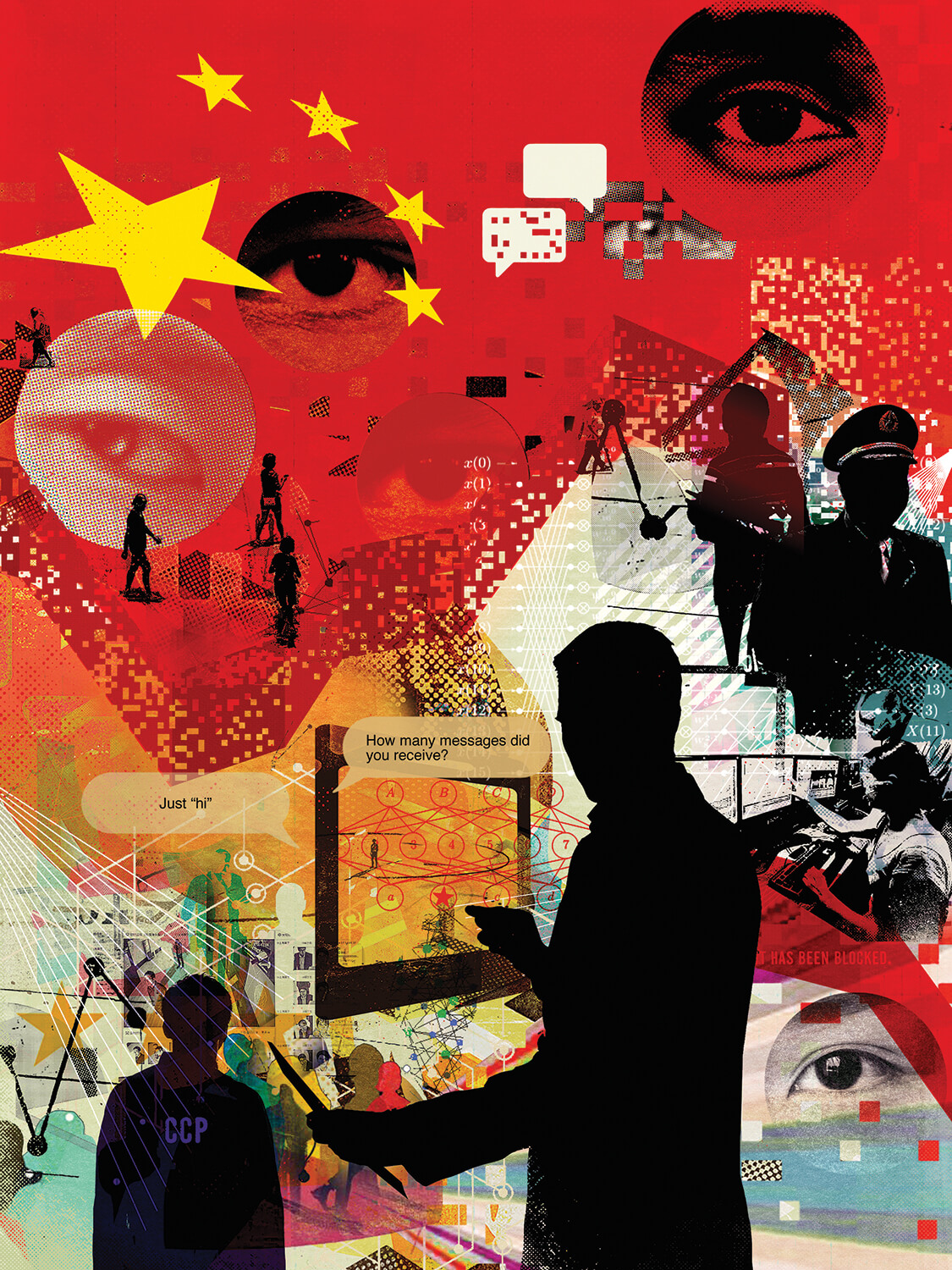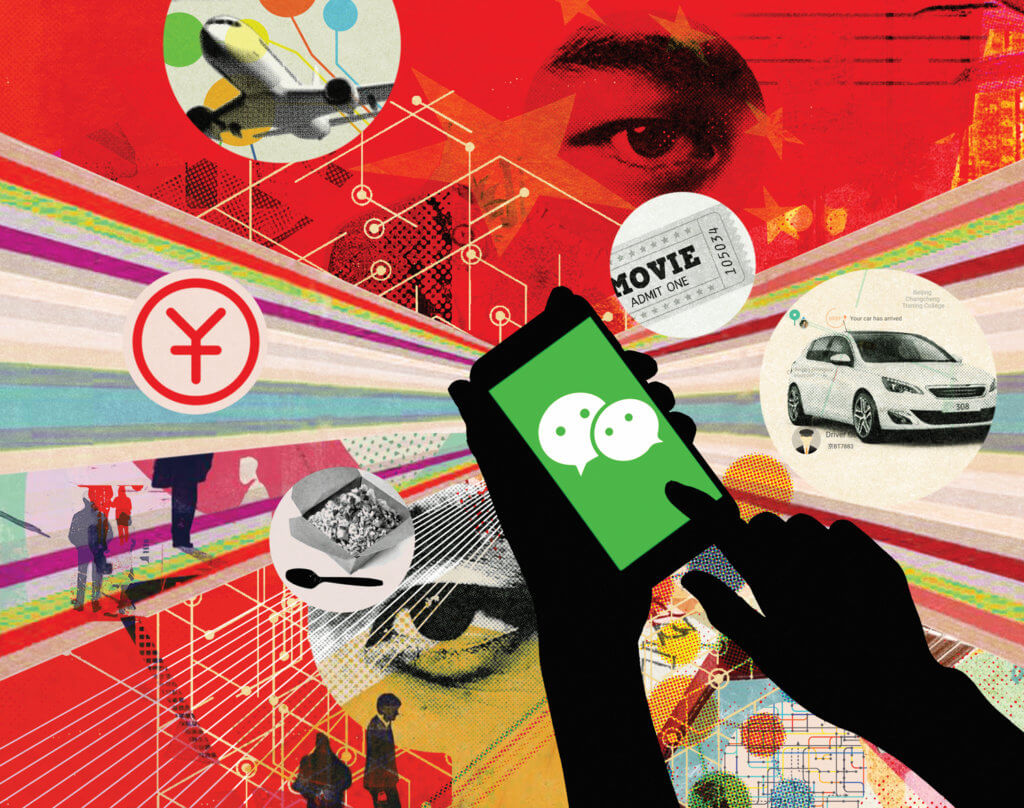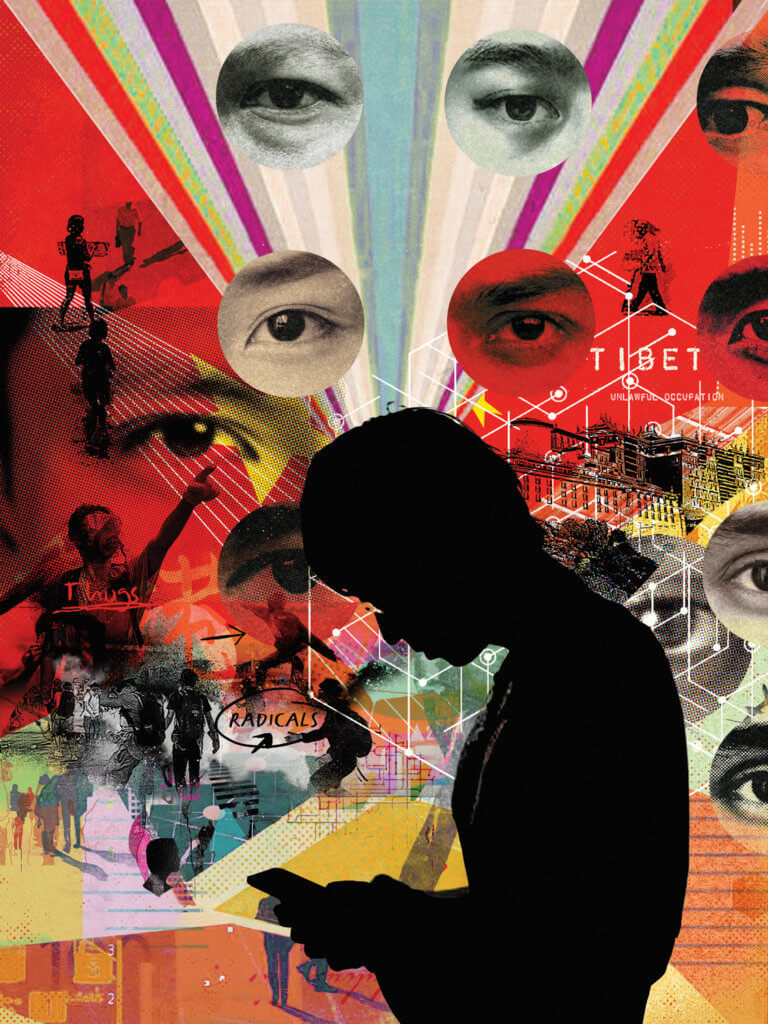
The Dark Side of WeChat
How the chat app turned “mega-platform” has become China’s ultimate tool for authoritarianism and censorship.
Fearing the free flow of information on the internet, the Chinese Communist Party (CCP) has banned all foreign internet services in China and built the Great Firewall to deny the Chinese people access to outside online sources. As a result, social media sites such as Facebook, Twitter, YouTube, and other services such as Google, Wikipedia, and Amazon are not available. In their place, China has developed its own domestic internet and affiliated services.
One such service is WeChat, a smartphone app that boasts “over 1.1 billion users”.1 Released by the state-sponsored company Tencent in 2011, it started out as a simple messaging app. However, hand in hand with its popularity, WeChat quickly grew into a “mega-platform,” boasting a massive number of practical features.2 The list of uses includes public social media, ordering food delivery, Uber/Lyft-like functionality, sending money to friends, making doctor’s appointments, paying bills, communicating in the business world, and even using government services.3 As its monopoly continues to expand, the app has become indispensable in Chinese citizens’ lives. Though it may sound like an exaggeration to someone who has not used the app before, “leaving WeChat means leaving [social] life in China,” not to mention missing out on the convenience of all of its other functions.4
Beyond its surface-level ease and accessibility, however, is a darker side, a side strictly monitored and regulated by the CCP: censorship. As cybersecurity journalist Patrick O’Neill detailed in a 2019 MIT Technology Review article, Beijing heavily pressures Tencent to implement effective real-time censorship of not only text, but also images posted to WeChat users’ Moments (analogous to Facebook’s timeline) and even in group chats and one-on-one conversations. In particular, it is the social dimension of WeChat that has allowed technology to become a powerful weapon in tightening censorship and state control in China.

Censorship has had a long and unfortunate history in China. Two millennia of emperors, wars, revolutions, and bloodshed after Qin Shi Huang, General Secretary Xi Jinping sits at the head of the CCP. Under his leadership, both traditional and newer internet media are being tightly regulated in order to avoid “potential subversion of authority,” going as far as jailing dissenting “journalists, bloggers, and activists.”5 With the emergence of WeChat, the CCP has a new medium, with cooperative developers, through which it can maintain its stranglehold on the availability of information. WeChat defines its mission as seeking to “improve the quality of life through internet value-added services,” but in reality, its work is to “reflect the party’s will, safeguard the party’s authority, and safeguard the party’s unity.”6,7 This is legally echoed in WeChat’s privacy policy, which offers no protection against government surveillance.8
WeChat’s model fits political theorist Langdon Winner’s outline of an authoritarian technology: It is “system centered” and “immensely powerful,” a technology that leads society toward authoritarianism.9 This is made evident by WeChat’s unprecedented rise and the ways that it censors information. As mentioned, WeChat is indispensable in today’s China. However, it has not become a backbone of Chinese lifestyle simply because of its usefulness; as long as it continues to align with the CCP’s values, it will receive plenty of help from the government. On top of granting subsidies to Tencent, Beijing has globally banned or heavily handicapped virtually all of WeChat’s foreign competitors, making it the only logical choice for practical use.10
This rise from service platform to infrastructure has allowed WeChat to become an easy one-stop shop for a large portion of the government’s censorship, fulfilling its role as an authoritarian technology. As the publishing platform of virtually all media outlets in China, as well as the newsfeed provider of most citizens, information flow can be strictly controlled with ease, effectively making WeChat a propaganda machine of the state. This is accomplished by Tencent’s censorship algorithms, ever-improving due to stress from Beijing such as monitoring by government agencies in “special operations.”11 Beyond simply blacklisting words and phrases, the real-time censorship technologies have even been improved to recognize images, and any text that may be contained in those pictures, using a self-reinforcing machine-learning approach to generate dynamic blacklists.12
WeChat scored dead last in Amnesty International’s ranking of messaging app privacy, achieving a grand total of zero out of one hundred points.
Technology becomes hazardous when it becomes the driving force of society due to people’s complete dependence on machines.13 The sticky nature of WeChat has not only enforced complete dependence by enhancing its users’ addictive behaviors; it has taken the hazard one step further by creating an intimate and dangerous one-way relationship with China’s central government through its censorship technologies.14
As a specific example, in the protests in which Hong Kong residents opposed the extradition law passed by the central government, WeChat played a prominent role in keeping mainland citizens out of the know. As a bit of background, Hong Kong holds a special classification different from the rest of China due to its previous status as a colony of the United Kingdom. It was returned to China in 1997 under the principle of “one country, two systems,” in which Hong Kong would enjoy “a high degree of autonomy” for 50 years.15 However, in June 2019, just 22 years later, plans of an extradition from Hong Kong to mainland China sparked protests in Hong Kong that have now grown to encompass more general arguments for democratic reform.16 Early in the protests, CNBC concluded that searching for the Hong Kong demonstrations on WeChat did not return any relevant results, and that images of the protests sent in one-on-one conversations did not go through.17
Not only has information availability been limited, but WeChat has also been the root of the spread of misinformation. The Guardian’s Lily Kuo recently reported that on WeChat’s newsfeeds, prior peaceful demonstrations were described as “riots,” protesters were portrayed as “radicals” and “thugs” “lured by the evil winds of foreign agents,” and the United States was accused of being the “black hand” behind the protests. By painting radicals or other nations as the instigator, the narrative in mainland China has been shifted toward a nationalist sentiment in which the protestors’ arguments are the minority, while the rest of Hong Kong’s citizens just want to live their lives peacefully under the CCP’s rule.18 As tensions continue to increase, Beijing can maintain its control over the rhetoric and keep its citizens in blissful ignorance by implementation of their nearly omnipotent authoritarian technology.

Meanwhile, WeChat has also begun its conquest of Tibet, a far-west region in China. Ever since the Dalai Lama’s failed uprising against the People’s Republic of China in 1959, activists have maintained a government-in-exile, claiming that “Tibet is an independent state under unlawful occupation.”19 However, as smartphone usage rises in the region, WeChat has invaded the lives of over 70% of the Tibetan population.20 As one would predict, the Dalai Lama’s spiritual messages are heavily censored by Tencent and the CCP, and users with dissenting political viewpoints are cut off from the internet by removing them from the app, effectively silencing activism.21 Rates of restrictions, fines, and arrests doled out have also been increasing, with recent news stating that Tibetans could face up to eight years of prison time for sharing information on WeChat about politically sensitive current events like Hong Kong’s protests.22 In this remote region over 1,500 miles away from Beijing, previous insurrection has been crushed, and new information is being censored easily through WeChat and looming punishments.
One final striking example of WeChat’s role as an extension of state control is in the introduction of China’s relatively new social credit system. This system is a way for the CCP to monitor, shame, and punish 1.4 billion Chinese citizens, separating the trustworthy from the disobedient. Just like a personal credit score, one’s social credit score can fluctuate depending on good behavior (e.g., paying bills on time) and bad behavior (e.g., smoking in a non-smoking zone), and those with low scores may be placed on blacklists in all aspects of life.23
Tencent and WeChat’s role in this topic of unease is its implementation of a system nicknamed the “Deadbeat Map.” This disturbing application will display the full name, court case number, reason they are deemed untrustworthy, and even partial home addresses of anyone with low social credit scores within a user’s 500-meter radius, with a radar changing colors as the density of “deadbeats” increases or decreases.24 This massive infringement of personal privacy by Western standards aims to enhance the repercussions of the social credit system by shaming the “deadbeats” and encouraging others to “treat those people as subhuman,” effectively making Chinese society a “virtual prison.”25 Without the support of WeChat as a medium, consequences of a low social credit score would obviously still be felt in citizens’ daily lives, but not in the same dimension as being publicly exposed and shunned by everyone within 500 meters.
With its willingness to provide users’ information, it is no surprise that Tencent’s WeChat scored dead last in Amnesty International’s ranking of messaging app privacy, achieving a grand total of zero out of one hundred points.26 With the role of media under President Xi Jinping’s reign to be supporting “the party’s unilateral rule, and nothing less,” WeChat has demonstrated its commitment to this philosophy from end to end, helping the CCP move quickly from its role of spectator to authority in today’s information age.27 Without resorting to brute force that would attract the attention of countries around the world, China has ensnared its people in a digital vice grip, filtering and manipulating this grasp as the CCP pleases. By downloading WeChat and clicking on the happy little icon, all that the Chinese citizens wanted was modern convenience. The price: whatever limited social and political freedom they had left, engulfed by the abyss of one of today’s most ambitious and successful authoritarian censors.
NOTES
1 Patrick Howell O’Neill, “How WeChat Censors Private Conversations, Automatically in Real Time.” MIT Technology Review (July 15, 2019).
2 Yujie Chen et al., Super Sticky WeChat and Chinese Society (U.K.: Emerald Publishing, 2018).
3 O’Neill, “How WeChat Censors Private Conversations.”
4 Chen, Super Sticky WeChat and Chinese Society.
5 Beina Xu, “Media Censorship in China.” Council on Foreign Relations, 2017, https://www.cfr.org/backgrounder/media-censorship-china.
6 Tencent, “Tencent,” 2019, https://www.tencent.com/en-us/abouttencent.html.
7 Beina Xu, “Media Censorship in China.”
8 Emma Lee, “Updated: WeChat’s Privacy Policy Update Draws Attention to Information Shared with the Government TechNode. TechNode (blog), September 19, 2017, https://technode.com/2017/09/19/now-its-official-wechat-is-watching-you-1/.
9 Langdon Winner, “Modern Technology: Problem or Opportunity?” Daedalus, Vol. 109, No. 1 (Winter 1980): 121-136.
10 Tenzin Dalha, “How WeChat Conquered Tibet,” 2019, https://thediplomat.com/2019/07/how-wechat-conquered-tibet/.
11 Chuin-Wei Yap, “Smartphone Messaging Apps Face New Pressure in China.” Wall Street Journal, May 27, 2014, sec. Tech. https://www.wsj.com/articles/smartphone-messaging-apps-face-new-pressure-in-china-1401191388.
12 Patrick Howell O’Neill, “How WeChat Censors Private Conversations, Automatically in Real Time.” MIT Technology Review (July 15, 2019), https://www.technologyreview.com/s/613962/how-wechat-censors-private-conversations-automatically-in-real-time/.
13 Leo Marx, “Technology: Emergence of a Hazardous Concept.” Technology and Culture, Vol. 51, no. 3 (July 2010): 561-577. Project MUSE, doi:10.1353/tech.2010.0009
14 Chen, Super Sticky WeChat and Chinese Society.
15 Matthew Campbell, “What Happens to Hong Kong When ‘One Country, Two Systems’ Expires in 2047.” Bloomberg.com, August 27, 2019, https://www.bloomberg.com/news/articles/2019-08-27/countdown-to-2047-what-will-happen-to-hong-kong-quicktake.
16 Helier Cheung and Roland Hughes, “The Background You Need on the Hong Kong Protests.” BBC News, September 4, 2019, sec. China. https://www.bbc.com/news/world-asia-china-48607723.
17 Arjun Kharpal, “How Social Media Is Shaping What People Know—and Don’t Know—about the Hong Kong Protests.” CNBC, June 13, 2019, https://www.cnbc.com/2019/06/13/hong-kong-protests-role-of-technology-and-china-censorship.html.
18 Lily Kuo, “Beijing’s New Weapon to Muffle Hong Kong Protests: Fake News.” The Observer, August 11, 2019, sec. World News. https://www.theguardian.com/world/2019/aug/11/hong-kong-china-unrest-beijing-media-response.
19 Walt van Pragg, “The Legal Status of Tibet,” 2010, https://www.culturalsurvival.org/publications/cultural-survival-quarterly/legal-status-tibet.
20 Dalha, “How WeChat Conquered Tibet.”
21 Dalha, “How WeChat Conquered Tibet.”
22 “Tibetan WeChat Users Could Face Eight Years in Prison for Sharing News about Hong Kong.” Free Tibet, September 5, 2019, https://freetibet.org/news-media/na/tibetan-wechat-users-could-face-eight-years-prison-sharing-news-about-hong-kong.
23 Ma, “China Has Started Ranking Citizens with a Creepy ‘Social Credit’ System.”
24 Erin Handley, “‘Deadbeat Map’: China Opens up Social Credit Scores to Social Media Platform WeChat.” Text. ABC News, January 24, 2019, https://www.abc.net.au/news/2019-01-24/new-wechat-app-maps-deadbeat-debtors-in-china/10739016.
25 Handley, “‘Deadbeat Map’.”
26 Angus Grigg, “WeChat’s Privacy Issues Mean You Should Delete China’s No. 1 Messaging App.” Australian Financial Review, February 21, 2018, https://www.afr.com/world/asia/wechats-privacy-issues-mean-you-should-delete-chinas-no1-messaging-app-20180221-h0wgct.
27 Bob Dietz, “In China, Mainstream Media as Well as Dissidents under Increasing Pressure,” October 7, 2014, https://cpj.org/blog/2014/12/China-mainstream-media-as-well-as-dissidents-under-incre.php and Phillip Bennett, “21st-Century Censorship.” Columbia Journalism Review, 2015, http://www.cjr.org/cover_story/21st_century_censorship.php.